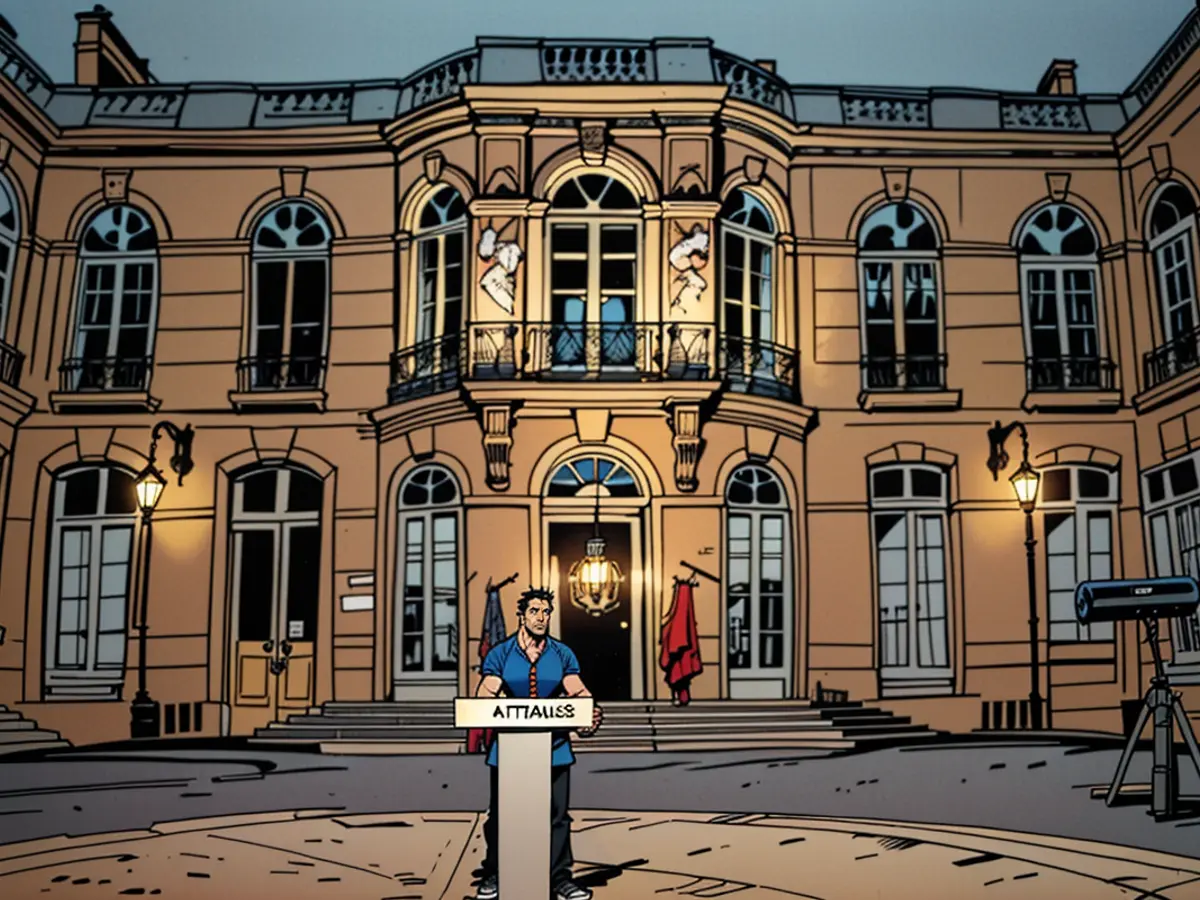"On the threshold of power": France's right-wing populists win first round of elections
France's President Emmanuel Macron called for a "broad, democratic and republican alliance" in light of the success of right-wing populists in the elections. The high voter turnout demonstrated the "desire to clarify the political situation," Macron stated.
Prime Minister Elisabeth Borne announced the withdrawal of around 60 candidates in the second round to prevent the victory of right-wing populist candidates. The government coalition is currently in third place with approximately 21 percent.
The left-green New Popular Front alliance is projected to receive approximately 28 percent of the votes. The Republicans, excluding their expelled party leader Eric Ciotti, have ten percent. The voter turnout was significantly higher than in 2022 at 65 percent or more.
Former RN party leader Marine Le Pen urged her supporters to secure an "absolute majority" for her party in the next round. Macron's camp is "practically wiped out," Le Pen declared, having been elected in her northern constituency in the first round.
Party leader Jordan Bardella sees himself as a future "Prime Minister for all French people" if his party obtains an absolute majority. He vowed to be "loyal to the constitution but unyielding," Bardella announced. The 28-year-old added.
Left-populist politician Jean-Luc Mélenchon called the result a "heavy and indisputable defeat for Macron." Mélenchon's La France Insoumise (LFI) party will withdraw some candidates to prevent the victory of RN candidates, he stated.
Experts warned of a political crisis in France following the election results. "The risk concretizes that France will find itself in a situation without parliamentary majority," said Jacob Ross from the German Institute for International and Security Affairs (SWP). Political instability will increase, he added.
It is also to be expected that the authority of the President will further shrink, said Yann Wernert from the Jacques Delors Center. "Power struggles between the various parties in this camp are likely to increase," he declared. Macron will have trouble gaining support in day-to-day political issues. "His voice will also lose weight in European politics," Wernert added.
The distribution of the 577 seats in the National Assembly will only be clear after the second round of elections. Around 65 to 85 candidates are expected to be elected in the first round. They do not need only an absolute majority of the votes but also a quarter of the registered voters.
For the second round, all candidates who receive the support of at least 12.5 percent of the registered voters qualify. Due to the high voter turnout, this number is significantly higher than before. In approximately 300 constituencies, it could potentially lead to three candidates progressing to the second round.
Should the RN obtain an absolute majority, France would experience its fourth cohabitation, in which the President and Prime Minister belong to different political camps. However, the ideological differences would be greater than ever before.
The RN has entered the race with a rigid European and foreigner-hostile program. The party has also promised substantial electoral gifts, some of which it has already toned down.
Concret will be the French party reduce EU contribution, introduce an upper limit for immigration, restrict the freedom of movement for Non-EU nationals, and bring professional bans for French citizens with dual citizenship. As one of the first measures, the value-added tax on gas and fuel should be reduced. The abolition of the pension reform will happen later.
- The success of right-wing populists in the Parliamentary election, such as the Rassemblement National (RN), has led President Emmanuel Macron to call for a "broad, democratic and republican alliance."
- Marine Le Pen, the former leader of the RN, urges her supporters to secure an "absolute majority" for her party in the next round of elections.
- Party leader Jordan Bardella of RN sees himself as a potential "Prime Minister for all French people" if his party obtains an absolute majority in the Parliamentary election.
- The withdrawal of around 60 candidates by the government coalition in the second round is aimed at preventing the victory of right-wing populist candidates like RN.
- The high voter turnout in the Parliamentary election showed a "desire to clarify the political situation," according to President Emmanuel Macron.
- The left-green New Popular Front alliance is projected to receive approximately 28 percent of the votes, while the Republicans, excluding Eric Ciotti, have ten percent.
- Experts have warned of a political crisis in France following the election results, citing the risk of France having no parliamentary majority.
- If the RN obtains an absolute majority, France would experience its fourth cohabitation, with the President and Prime Minister belonging to different political camps.
- The RN has entered the Parliamentary election with a rigid European and foreigner-hostile program, promising substantial electoral gifts and reducing EU contributions.







